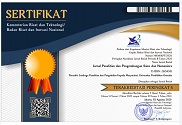Influence of Social Entrepreneurship Training on Job Creation in Ilorin's Small Business Sector
DOI:
https://doi.org/10.23887/jppsh.v7i2.68251Keywords:
Social Entrepreneurship, Small Business, Job Creation and Economic DevelopmentAbstract
Small and medium enterprises, particularly micro-businesses have been the rescue platform for the survival and sustainability of the poor, unemployed youths and women as well as being the nursery-bed of entrepreneurship development in the nation. The study analyzes the influence of social entrepreneurship training on job creation in Ilorin's small business sector. The study focuses on understanding the impact of social entrepreneurship training programs on the ability of small business owners in Ilorin to create employment opportunities. The study adopted a descriptive survey research design. The study sampled 226 small business enterprises out of 520 using the Taro Yamane Coefficient of Variation formula. The researcher's instrument for data collection was a well-structured five-point Likert scale questionnaire which was administered to entrepreneurs from each selected entrepreneurial business type comprised of poultry farming, snail rearing, Rabbit rearing and 58 fish farming. The study adopted regression analysis and Pearson product moment correlation coefficient to test the hypotheses. The findings reveal that social entrepreneurship training has a significant positive influence on job creation in Ilorin's small business sector. Small business owners who have received training are more likely to create employment opportunities compared to those who have not undergone any training. It was concluded from the findings of the study that the social entrepreneurship development programs have greatly contributed to the rate of growth of small business enterprises in Ilorin.
References
Adebayo, S. O., Osagu, J., & Ogunleye, A. (2013). Relationships between job challenge and burnout among health workers in Ekiti State University Teaching Hospital, Ado-Ekiti, Nigeria. International Journal of Case Studies, 2(6). https://papers.ssrn.com/sol3/papers.cfm?abstract_id=2868285.
Afolabi, A. (2015). The effect of entrepreneurship on economic growth and development in Nigeria. International Journal of Development and Economic Sustainability, 3(2), 49–65. http://eprints.abuad.edu.ng/49/.
Alvord, S. (2014). Social entrepreneurship and social transformation: An exploratory study. Journal of Applied Behavioral Science, 40(1). https://doi.org/10.1177/002188630426684.
Amofah, S., & Agyare, L. (2022). Poverty alleviation approaches of development NGOs in Ghana: Application of the basic needs approach. Cogent Social Sciences, 8(1), 1–8. https://doi.org/10.1080/23311886.2022.2063472.
Atakpa, R. A. (2016). Entrepreneurship Education in Tertiary Institutions in Nigeria: relevance, challenges and strategies. Online Journal of Arts, Management and Social Sciences (OJAMSS), 1(2). https://pdfs.semanticscholar.org/d98e/e064732c40a504785466544df7c47860664f.pdf.
Deesomsak, R., Paudyal, K., & Pescetto, G. (2004). The determinants of capital structure: evidence from the Asia Pacific region. Journal of Multinational Financial Management, 14(4), 387–405. https://doi.org/10.1016/j.mulfin.2004.03.001.
Ebitu, E. T. (2016). Marketing Strategies and the Performance of Small and Medium Enterprises in Akwa Ibom State, Nigeria. European Centre for Research Training and Development UK, 4(5). http://m.uka-tka.com/wp-content/uploads/Marketing-Strategies-and-the-Performance-of-Small-and-Medium-Enterprises-in-Akwa-Ibom-State-Nigeria.pdf.
Giri, A. K., & Joshi, P. (2017). The impact of macroeconomic indicators on Indian stock prices: An empirical analysis. Studies in Business and Economics, 12(1), 61–78. https://doi.org/10.1515/sbe-2017-0005.
Henrekson, Magnus, Sanandaji, & Tino. (2014). Small Business Activity Does Not Measure Entrepreneurship. Proceeding of National Academy of Science USA, 111, 1760–1765. https://www.pnas.org/content/111/5/1760.short.
Himani, M. K. (2017). Role of Entrepreneurial Development Programmes in Growth of Entrepreneurship in India. International Journal of Latest Technology in Engineering, Management and Applied Science (IJLTEMAS, 6(6). https://www.academia.edu/download/54629762/22-26.pdf.
Hoque, A. S. M. M., & Zainudin, A. (2016). The Impact of Marketing Strategy on Small and Medium Scale Enterprises (SMEs): Case Study in Bangladesh. International Postgraduate Research Conference (IPZRC, 8–10.
Iganiga, B. O., & Unemhilin, D. O. (2011). The Impact of Federal Government Agricultural Expenditure on Agricultural Output in Nigeria. Journal of Economics, 2(2). https://doi.org/10.1080/09765239.2011.11884939.
Isenberg, D. (2011). The Entrpreunership Ecosystems Strategy as a New Paradigm of Economics Policy: Principle for Cultivating Entreprenuership. Presentation at the Institute of International and European Affairs, 1(781), 1–13. http://www.innovationamerica.us/images/stories/2011/The-entrepreneurship-ecosystem-strategy-for-economic-growth-policy-20110620183915.pdf.
Kehinde, O. J., Abiodun, A. J., Adegbuyi, O., & Oladimeji, H. (2016). Small and Medium Scale Enterprises: Pivotal to Sustainable Economic Development: The Nigerian Experience. International Journal of Current Research, 8(1). https://www.ajol.info/index.php/afrrev/article/view/60249/48494.
Kwesi, P., & Adjololo, E. (2018). Appraising the Effect of Marketing Strategies on the Performance of Small and Medium-Sized Enterprises (SMEs) in Ghana. Journal of Emerging Trends in Personnel Management, 23(12).
Mercy, M. A. (2016). Non-Governmental Organisations and Social Entrepreneurship Growth in Niger State of Nigeria. Journal of African Political Economy & Development, 1. https://hdl.handle.net/10520/EJC-c3cfc5527.
Ogundele, O. J. K., Waidi, A. A., & Hammed, B. A. (2012). Entrepreneurship Training and Education as Strategic Tools for Poverty Alleviation in Nigeria. American International Journal of Contemporary Research, 2(1). https://citeseerx.ist.psu.edu/document?repid=rep1&type=pdf&doi=58fdc1881b1717e72d7157b971502e51ab31e590.
Oladipupo, A. O., & Obazee, U. (2016). Tax Knowledge, Penalties and Tax Compliance in Small and Medium Scale Enterprises in Nigeria. IBusiness, 08(01), 1–9. https://doi.org/10.4236/ib.2016.81001.
Peter, V. D. S., & Geertjan, W. (2013). Benefits and Impact of Mentoring for Entrepreneurs: The entrepreneur’s perspective. International Journal of Human Resource Studies, 3(4). https://doi.org/10.5296/ijhrs.v3i4.4581.
Rita, A. A. (2016). Entrepreneurship Education in Tertiary Institutions in Nigeria: Relevance, Challenges and Strategies. Online Journal of Arts, Management and Social Sciences (OJAMSS, 1(2). http://seahipaj.org/journals-ci/sept-2021/IJBLR/full/IJBLR-S-9-2021.pdf.
Saidi, A. A., & Olushola, O. D. (2016). Impact of Entrepreneurship Ventures on Development of Small and Medium Enterprises in Nigeria case study of three territorial Districts in Osun state, Nigeria. International Journal of Economics, Commerce and Management, 4(9). https://www.academia.edu/download/51222369/4929.pdf.
Shinnar, R. S., Hsu, D. K., Powell, B. C., & Zhou, H. (2018). Entrepreneurial intentions and start-ups: Are women or men more likely to enact their intentions? International Small Business Journal: Researching Entrepreneurship, 36(1), 60–80. https://doi.org/10.1177/0266242617704277.
Thaddeus, E. (2012). Perspectives: Entrepreneurship Development & Growth of Enterprises in Nigeria. Entrepreneurial Practice Review, 2(2), 31–35. https://www.academia.edu/download/34120015/enterpreneur.pdf.
Ukko, J., Nasiri, M., Saunila, M., & Rantala, T. (2019). Sustainability strategy as a moderator in the relationship between digital business strategy and financial performance. Journal of Cleaner Production, 236, 117626. https://doi.org/10.1016/j.jclepro.2019.117626.
Umar, P. (2015). Small and medium-scale enterprises as a survival strategy for employment generation. Journal of Sustainable, 4(1). https://knowledgewords.com/images/The_Nature_of_Small_and_Medium_Scale_Enterprises_(SMEs)_Government_and_Financial_Institutions_Support_in_Nigeria.pdf.
Yamane, T. (1967). Statistics: An Introductory Analysis (E. Harper & Row (eds.); 2nd ed.).
Yunus, N., Ramli, R., & Hassan, N. S. A. (2017). Tax Penalties and Tax Compliance of Small Medium Enterprises (SMEs) in Malaysia. International Journal of Business, Economics and Law, 12(1), 81–91. http://ijbel.com/wp-content/uploads/2017/07/ACC-342.pdf.
Yusoff, Y. M., Omar, M. K., Kamarul Zaman, M. D., & Samad, S. (2019). Do all elements of green intellectual capital contribute toward business sustainability? Evidence from the Malaysian context using the Partial Least Squares method. Journal of Cleaner Production, 234, 626–637. https://doi.org/10.1016/j.jclepro.2019.06.153.
Yusuf, M. M., & Kabiru, I. D. (2014). Entrepreneurship Development Programmes and the Challenge of Building Entrepreneurial Capacity of Youth in Kano State, Nigeria. International Journal of Management Sciences, 4(3). https://ideas.repec.org/a/rss/jnljms/v4i3p2.html.
Zaenab, S., Chamisijatin, L., & Wahyuni, S. (2020). Strengthening character education through literacy movement at Muhammadiyah junior high schol. Journal of Community Service and Empowerment, 1(1), 54–63. https://doi.org/10.22219/jcse.v1i1.11516.
Zira, C. T. O., & Charles, J. M. I. (2017). The Impact of SME Financing on Business Growth in Nigeria: A Study of Keffi and Mararaba Metropolis. International Journal of Innovation and Economic Development, 3(2). https://doi.org/10.18775/ijied.1849-7551-7020.2015.32.2004.
Downloads
Published
Issue
Section
License
Copyright (c) 2023 Tajudeen Ade Jamiu, Moses Adeleke Adeoye

This work is licensed under a Creative Commons Attribution-ShareAlike 4.0 International License.
Authors who publish with the Jurnal Penelitian dan Pengembangan Sains dan Humaniora agree to the following terms:
- Authors retain copyright and grant the journal the right of first publication with the work simultaneously licensed under a Creative Commons Attribution License (CC BY-SA 4.0) that allows others to share the work with an acknowledgment of the work's authorship and initial publication in this journal.
- Authors are able to enter into separate, additional contractual arrangements for the non-exclusive distribution of the journal's published version of the work (e.g., post it to an institutional repository or publish it in a book), with an acknowledgment of its initial publication in this journal.
- Authors are permitted and encouraged to post their work online (e.g., in institutional repositories or on their website) prior to and during the submission process, as it can lead to productive exchanges, as well as earlier and greater citation of published work. (See The Effect of Open Access)









